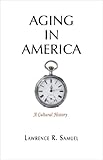Aging in America : A Cultural History / Lawrence R. Samuel.
Material type: TextPublisher: Philadelphia : University of Pennsylvania Press, [2017]Copyright date: ©2017Description: 1 online resource (208 p.)Content type:
TextPublisher: Philadelphia : University of Pennsylvania Press, [2017]Copyright date: ©2017Description: 1 online resource (208 p.)Content type: - 9780812293654
- Aging -- History -- 20th century -- United States
- Aging -- History -- 21st century -- United States
- Aging -- Social aspects -- History -- 20th century -- United States
- Aging -- Social aspects -- History -- 21st century -- United States
- Aging -- Social aspects -- United States -- History -- 20th century
- Aging -- Social aspects -- United States -- History -- 21st century
- Aging -- United States -- History -- 20th century
- Aging -- United States -- History -- 21st century
- Older people -- United States -- History -- 20th century
- Older people -- United States -- History -- 21st century
- Population aging -- United States -- History -- 20th century
- Population aging -- United States -- History -- 21st century
- American History
- American Studies
- Cultural Studies
- HISTORY / United States / General
- 305.260973 23
- HQ1064.U5 S255 2017
- online - DeGruyter
| Item type | Current library | Call number | URL | Status | Notes | Barcode | |
|---|---|---|---|---|---|---|---|
 eBook
eBook
|
Biblioteca "Angelicum" Pont. Univ. S.Tommaso d'Aquino Nuvola online | online - DeGruyter (Browse shelf(Opens below)) | Online access | Not for loan (Accesso limitato) | Accesso per gli utenti autorizzati / Access for authorized users | (dgr)9780812293654 |
Browsing Biblioteca "Angelicum" Pont. Univ. S.Tommaso d'Aquino shelves, Shelving location: Nuvola online Close shelf browser (Hides shelf browser)

|

|

|

|

|

|

|
||
| online - DeGruyter Human Rights and War Through Civilian Eyes / | online - DeGruyter Red Ties and Residential Schools : Indigenous Siberians in a Post-Soviet State / | online - DeGruyter Sensible Flesh : On Touch in Early Modern Culture / | online - DeGruyter Aging in America : A Cultural History / | online - DeGruyter The Museum at the End of the World : Encounters in the Russian Far East / | online - DeGruyter Nature Speaks : Medieval Literature and Aristotelian Philosophy / | online - DeGruyter War Is Coming : Between Past and Future Violence in Lebanon / |
Frontmatter -- Contents -- Preface -- Introduction -- 1. Old in the Country of the Young -- 2. The De-Aging of America -- 3. The Aging of Aquarius -- 4. The Perpetual Adolescent -- 5. The Silver Tsunami -- 6. Raging Against Aging -- Conclusion -- Notes -- Selected Bibliography -- Index
restricted access online access with authorization star
http://purl.org/coar/access_right/c_16ec
Aging is a preoccupation shared by beauty bloggers, serious journalists, scientists, doctors, celebrities—arguably all of adult America, given the pervasiveness of the crusade against it in popular culture and the media. We take our youth-oriented culture as a given but, as Lawrence R. Samuel argues, this was not always the case. Old age was revered in early America, in part because it was so rare. Indeed, it was not until the 1960s, according to Samuel, that the story of aging in America became the one we are most familiar with today: aging is a disease that science will one day cure, and in the meantime, signs of aging should be prevented, masked, and treated as a source of shame.By tracing the story of aging in the United States over the course of the last half century, Samuel vividly demonstrates the ways in which getting older tangibly contradicts the prevailing social values and attitudes of our youth-obsessed culture. As a result, tens of millions of adults approaching their sixties and seventies in this decade do not know how to age, as they were never prepared to do so.Despite recent trends that suggest a more positive outlook, getting old is still viewed in terms of physical and cognitive decline, resulting in discrimination in the workplace and marginalization in social life. Samuels concludes Aging in America by exhorting his fellow baby boomers to use their economic clout and sheer numbers to change the narrative of aging in America.
Mode of access: Internet via World Wide Web.
In English.
Description based on online resource; title from PDF title page (publisher's Web site, viewed 26. Aug 2020)


